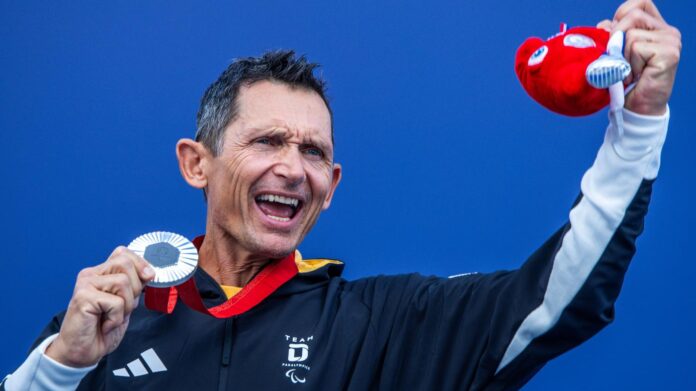According to para-cyclist Michael Teuber, the two most important things you need to be successful in competitive sport for as long as he has been are a love of your sport and a competitive spirit. He loves the versatility of cycling. You can go on challenging tours and admire the landscape at the same time. He has also always enjoyed endurance sports and, even after more than 20 years as an athlete, he still wants to test out what is possible.
At the Paralympics medals are his clear goal. He certainly has the ambition and the “fire in his veins” that you need to achieve this goal – even as an “old-school athlete”. It is clear that the games in Paris are “more towards the back end” of his career, says the 56-year-old. But he still cannot think about quitting at the moment, because “it’s always just the next competition that counts”.
The plan to concentrate fully on the upcoming competitions seems to have worked: On Wednesday morning, Michael Teuber won the silver medal for Team Germany. Teuber completed the 14.1-kilometer course with 140 meters of elevation in a time of 21:18.14 minutes, leaving him about 38 seconds behind his long-time competitor Ricardo Ten Argiles from Spain. But Teuber is not disappointed about this; he is “overjoyed” to have secured the silver medal.
The German women also raced onto the podium in the individual time trial on Wednesday: Maike Hausberger won gold, Annika Zeyen-Giles secured bronze. This completed the medal set for the German para-cycling team.
The road races are a great event, even if the triathletes were a little better off with the location, adds Teuber with a laugh. Unlike the triathlon, the road races do not take place in the heart of Paris, but in Clichy-sous-bois, about 16 kilometers away. Despite his many successes, it is not a given that the Bavarian will be able to start here on Wednesday.
Just last March, Teuber had a serious accident while training on the Canary Islands. He collided with a car and suffered, among other things, an open collarbone fracture, several broken ribs and a broken vertebra: “That was really bad,” he says. After a few weeks in hospital, he started training again as soon as possible. Nevertheless, his form was initially at rock bottom and he had to slowly work his way back. But that doesn’t mean he’s poorly prepared. On paper, he’s even trained more than before the Paralympic Games in Tokyo in 2021 and has already covered over 13,000 kilometers in the saddle this year.
Whether the discipline he showed was worth anything can only be judged after the race. By Wednesday in Paris at the latest, it will be clear that the hard work was worth it. Despite the strong comeback, the accident has changed his relationship to cycling: “Fear is part of it and that may cost me a second or two in a bend.” The athlete has been partially paralyzed since a car accident at the age of 16.
Due to the vertebral fracture sustained in the training accident, Teuber was not far from being further paralyzed, so a little more respect is understandable. In general, he would rate road safety for cyclists in Germany as “relatively good”. The situation is often much worse abroad and more “consideration and respect” is needed from drivers.
Despite everything, he was really looking forward to the games in Paris. The whole feeling during the Paralympics is something very special. Just living in the Paralympic Village, together with thousands of other athletes, gives you the feeling of being part of something bigger. According to Teuber, Paris does not quite come close to the Paralympic Games in London in 2012. Great Britain was “super nice” as host and, above all, brilliantly focused on the idea of inclusion. At that time, it was possible to “understand this continuation from Olympic to Paralympic Games as a unit”.
This does not necessarily mean that the Olympic and Paralympic Games should become one big sporting event in the future. The organizational effort for a single city would probably be far too great. In recent years, says Teuber, who has been involved since the 2000 Games in Sydney, some milestones have been reached in terms of the presence of the Paralympics and the merging of the Olympics and Paralympics, but there is still room for improvement.
Just looking at the media coverage, it is noticeable that “as good as it is, it still falls far behind the Olympic Games.” As long as the games are separated, one cannot speak of an inclusive event. There is still a lot to do before Los Angeles 2028, and the way things are looking now, Teuber could show what he can do again in four years.
